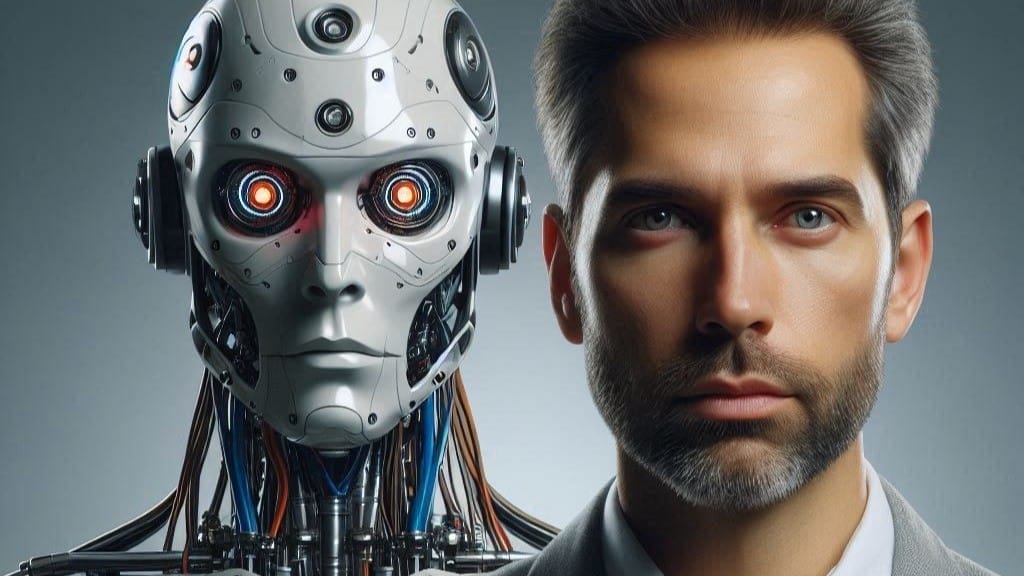
As artificial intelligence (AI) continues to transform our world, fears are growing that the technology is taking over. Companies are reducing staff as they evaluate and put in place AI tools to reduce overhead costs, improve workflows, and increase productivity. As high-tech and several technology industries continue seeing an increase in layoffs, some fear this turn in the job market is an indication of an anticipated “AI Apocalypse.” Technology experts believe AI will make undoubtedly drastic changes and there is no better time than now to get involved and stay ahead of the curve.
Why Learn About AI
Imagine standing on the shore, watching a monumental wave approach. You can either turn away or grab a surfboard and ride it toward new adventures. The advent of Artificial Intelligence (AI) is that wave, echoing the transformative swell of the Internet decades ago.
When the Internet began weaving its web across the globe, it was met with a mix of confusion and apprehension like security concerns when sharing information, hackers, and privacy breaches. The Internet brought forth job displacement fears and anxiety that automation and digital processes would replace human jobs, particularly in manufacturing and administrative roles. There was a resistance to change with many holding on to traditional methods and being skeptical of the necessity or longevity of this new technology.
Yet, those who embraced the Internet found themselves at the forefront of innovation. The same is true today for AI and the social impact with its uprising.
Common Applications and Use for AI Today
AI is already making remarkable strides in various fields, with its applications and use growing at an overwhelming pace, such as:
- Natural Language Processing (NLP): interpreting, generating, predicting, and translating human language and prompts. e.g., chatbot, real-time language translation, text-to-speech, sentiment analysis in writing recognition, summarizing written text, etc.
- Computer Visioning: AI recognizes images, objects, activities, and actions in real-time mode akin to human sight. e.g., facial recognition to unlock your cellphone, autonomous vehicles recognizing road obstacles, medical imaging analysis and diagnostics, summarizing videos and movies, etc.
- Speech Recognition and Synthesis: advances in the area of recognizing voice, music, and sounds and the ability to regenerate, mimic, and in some cases impersonate voice patterns. e.g., Virtual assistants like Google Home, Amazon Alexa, and Apple Siri have been upgraded with tools like Google Gemini and real human-like dialog and communication.
- Self-Driving and Driver Assistants: many vehicles are now equipped with lane change assistance, crash deterrence and detection systems, automatic braking mechanisms, and other autonomous vehicle technology. e.g., Tesla’s Autopilot, Waymo’s driverless Jaguar taxis, package delivery drones, etc.
- Advanced Healthcare Diagnostics: advancements in medical devices and software applications provide tools to look through images and diagnostic reports for anomalies, helping physicians make quicker diagnoses and treatment decisions.
- Behavioral Recommendation Systems: algorithms meant to explore your likes and dislikes, analyze your patterns, are being utilized for personalizing user experiences, making recommendations for either targeted marketing purposes and other reasons. e.g., Netflix suggesting shows, Amazon recommending products, Spotify curating playlists based on songs you listen to most often.
- Robotics and Automation: intelligent robots are already performing tasks in dynamically changing environments such as in manufacturing automation, surgical procedures and robotic surgeries, warehouse logistics like those used by Amazon.
- Game Playing, Trivia, Simulation, and Strategy: AI surpasses human capabilities in complex games such as IBM Watson beating recurring champions on various episodes of Jeopardy, DeepMind’s AlphaGo defeating Go champions, OpenAI’s bots excelling in Dota 2, and ChatGPT acing the LSAT and MCAT exams for entrance in law or medical school.
- Financial Analysis: AI systems can process vast amounts of financial data in very quickly allowing for enhanced financial accuracy and efficiency in areas such as algorithm analytics, investments and trading, fraud detection, credit scoring.
- Content Creation: AI can quickly generate original content across multiple mediums. Where there is a need for writing news articles with ChatGPT or Microsoft CoPilot, composing music with Riffusion, Suno, or Udio, creating artwork with tools like DALL·E, the use of artificial intelligence for developing content is one of the most sought out features.
- Farming and Agricultural Automation: new technology is aiding and optimizing farming practices with predictive analytics for crop yields, drone monitoring, and soil analysis increasing food production efficiency and sustainability.
- Software Development: new AI tools have emerged for quick development and deployment of software applications, or for assistance with creation of code that developers can add to their own applications with great ease.
- Cybersecurity: AI detects and mitigates threats proactively. This can serve in the case of anomaly detection in network traffic, automated threat response, and strengthening defense against cyber-attacks.
Areas Where AI Falls Short
There are areas where AI still lags behind humans. Understanding these gaps and preparing accordingly will help us thrive in an AI-dominated future.
1. Creativity and Emotional Intelligence: AI struggles to generate truly original ideas and lacks the nuanced understanding of human emotions. This includes fields such as art, literature, and counseling.
2. Critical Thinking and Problem Solving: Complex, multi-dimensional problems that require an understanding of context, ethics, and human experience are still best handled by humans.
3. Interpersonal Skills: Building relationships, negotiating, and managing teams effectively are areas where human touch is irreplaceable.
Activities AI Can Be Most Suited For
1. Data Analysis: AI excels at analyzing large datasets, identifying patterns, reviewing large volumes of information, and providing summaries and insights.
2. Routine Tasks: Administrative work, scheduling, and basic customer service tasks can be automated by AI, including ability to search through a list of frequently asked questions and answers (FAQs), answering questions about product features, and provide how-to details.
3. Predictive Maintenance: In industries like manufacturing, AI can predict equipment failures and automatically schedule or recommend maintenance.
Preparing for the AI Future
With all the advances and investments in AI, along with promises of quantum computing and computer chips capable of processing data at phenomenal speeds, the use and application of technology will exponentially increase. It is necessary to dive in head first in order to keep up! AI is and will continue to be all around us. With tools and new features being pushed down via on-air updates to our cars, cellphones, TVs, and streaming services, it will require us all to adopt to changes. Here’s a short-list of tips to help you prepare for the future.
1. Embrace Lifelong Learning: Stay curious and continuously update your skills. Enroll in online courses, attend workshops, and read extensively about AI and its implications. There are so many FREE courses available today.
2. Develop Emotional Intelligence: Enhance your ability to empathize, communicate, and manage relationships. These skills will remain valuable as AI lacks true emotional understanding.
3. Cultivate Creativity: Engage in activities that spark creativity, such as painting, writing, or brainstorming innovative solutions. Creativity is one of the areas where AI cannot compete.
4. Hone Critical Thinking Skills: Practice analyzing complex problems, considering multiple perspectives, and making well-informed decisions. These skills will help you tackle challenges that AI cannot address.
5. Stay Technologically Savvy: Familiarize yourself with AI tools and technologies. Understanding how AI works will give you an edge in leveraging it effectively in your career.
While AI continues to evolve and transform various industries, human intelligence still prevails in certain areas. By focusing on our unique strengths and preparing for the future, we can not only survive but also thrive in the age of AI.
### End of Article
The views and opinions shared in this post are of the author’s personal and professional opinion and are in no way the opinions of his clients, employers, colleagues, or any of their agents or affiliates. This is not to be understood to be legal advice or advice of any kind. Personnel seeking advice should retain the services of a qualified information security and privacy governance subject-matter expert.





